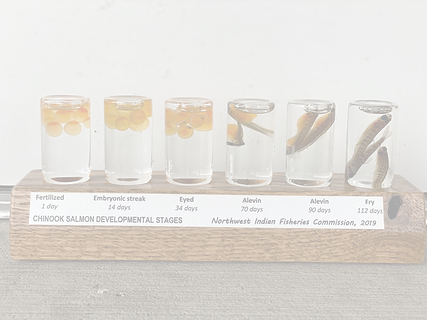
"the mountain and the sea are excellent schoolmasters, and teach some of us more than we can ever learn from books." -john lubbock
Meet Our Team
The Salish Sea School is committed to cultivating and preserving a culture of diversity, inclusion, and connectedness. We are able to grow and learn better together with a diverse team. We welcome the unique contributions that one can bring in terms of their education, opinions, culture, ethnicity, race, sex, gender identity and expression, nation of origin, age, languages spoken, veteran’s status, color, religion, disability, sexual orientation and beliefs.
We are stronger together with the collective sum of individual differences, life experiences, knowledge, innovation, self-expression, and talent which ultimately brings about a healthier planet.
Click on the pictures below to learn more.

STaRS Program Summary:
STaRS (Students Training as Research Scientists) is a marine science field research program.
Throughout the year, students will participate in fieldwork with a small group and, engage in virtual meetings with the project leader to prepare for their final project.
We are offering two different STaRS programs in 2025:

Program Outcomes:
-
Practice the scientific method.
-
Gain experience with field research tools and techniques.
-
Understand how research informs policy and conservation.
-
Analyze scientific literature.
-
Develop presentation and science communication skills.
Program Goals:
-
Spark interest in marine science/conservation careers.
-
Train future ocean advocates and informed citizens.
-
Explore scientific fields.
-
Recruit and mentor future marine scientists.
-
Build confidence in academic and professional settings.
-
Provide hands-on field research opportunities.

Salmon STaRS
Join a small group of student scientists to explore the world of salmon in the Salish Sea.
Over the course of eight months, we will: observe and study the growth of salmon from eggs to fry, learn about salmon biology from a salmon biologist, collect samples to test for water quality from local creeks, conduct a salmon spawning survey, and take field trips to salmon hatcheries and water quality laboratories.
Participants will pursue a scientific question, collect data, and analyze and present their preliminary findings.
This course will include six one-hour Zoom sessions, three land-based field trips and one boat-based field trip.
Note: 6 students are required to be registered for this course to move forward*
Why This Course is Worth It
This unique program turns students into real-world scientists. Through hands-on field trips, water testing, and salmon surveys, your child will:
-
Learn from a salmon biologist
-
Build STEM and leadership skills
-
Explore local creeks, labs, and hatcheries
-
Conduct their own research project
-
It’s a one-of-a-kind opportunity to connect with nature, gain real science experience, and grow as a curious, confident learner.
Timeframe: September 2025- April 2026,
Age: MS-HS students
Location: The Salish Sea School's Discovery Center in Skyline Marina in Anacortes + a few virtual zoom meetings + field trips around the region. You can live anywhere in the Puget Sound region and attend this course!
Cost: $650, payment plan available, email info@thesalishseaschool.org
Class size: No more than 6 students
Project Leader: Elizabeth Drozda
Science Advisor: Craig Olson, Retired fish pathologist
Requirements: must be available for the following dates: Zoom sessions: 6PM to 7PM September 4, October 2, January 8, February 12, March 19, April 23. Field Trips: September 16; November 15, 11AM-3PM; February (TBD); April 18, 11:00AM to 4:00PM

Marbled Murrelet STaRS (12 months)
Why is this project important?
The marbled murrelet (MAMU) is an endangered seabird that plays a vital role as a bioindicator of the health of inshore marine ecosystems. MAMUs are highly vulnerable, relying on marine habitats for foraging and old-growth forests for nesting. Yet, there is a critical gap in understanding their habitat use and how human disturbances, such as boat traffic, affect their populations.
Our project aims to close this knowledge gap by conducting essential sister studies at two key MAMU hotspots: Browns Point Lighthouse (Pierce) and Washington Park (Skagit). These studies will provide invaluable data on MAMU population status, foraging behavior, and interactions with boat traffic, offering crucial insights for conservation strategies to preserve both the species and the marine ecosystems they reflect.
What Will Students Do?
Students will collaborate with Olivia Fross and Dr. Hodum from the University of Puget Sound and Oikonos to develop and implement shore- and boat-based surveys for the endangered marbled murrelet.
Throughout the year, Olivia and Dr. Hodum will guide students through the scientific research process, including data collection, analysis, and presentation.
Through a mix of in-person shore-based and boat-based surveys, along with virtual meetings, students will learn about the thought processes and considerations involved in taking a scientific project from the initial question to fieldwork, analysis, and final presentation.
Note: The schedule will depend on weather and water conditions, and a minimum of four students must be enrolled for the program to proceed.
Timeframe: January 2025-January 2026
Age: 12-17 years old
Location: Launch out of Skyline Marina in Anacortes + virtual meetings via zoom
Cost: $1300, payment plan available @ $110 per month
Class size: 4-6 students
Project Leader: Olivia Fross
Science Advisor: Dr. Peter Hodum, University of Puget Sound
Captain(s): Amy Eberling & Sam Murphy
Requirements: must be available on weekends for shore and boat-based surveys in Anacortes, unless doing an independent project from another MAMU survey location.**
Schedule: The draft schedule is below. This will be finalized in early January to confirm dates and times with students enrolled.
**If you are a student near Tacoma or another known MAMU hotspot, we can turn this project into an land-based bird study from your location.

Qualifications for Enrollment in the 2025 Marbled Murrelet STaRS Program:
-
Ability to maintain focus and attentive during 2-4 hours of field observation.
-
Experience in or willingness to learn public speaking skills.
-
Availability for approximately 1-2 hours of at-home work each month and 1-3 hours of fieldwork.
-
Must be allowed to access our Discord channel for group communication.
Traveling from afar? Here are some places nearby!



